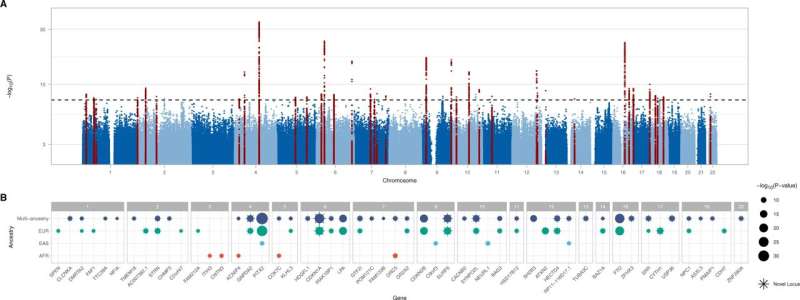This article has been reviewed according to Science X's editorial process and policies. Editors have highlighted the following attributes while ensuring the content's credibility:
fact-checked
peer-reviewed publication
trusted source
proofread
Identifying new genetic variants linked to heart failure

Scientists have identified new genetic variants linked to heart failure, according to a study published in Nature Communications.
The study, which analyzed the genomes and ancestries of more than 115,000 patients experiencing heart failure, details 47 risk loci in the human genome where genetic variants may indicate an increased risk of heart failure. Additionally, investigators identified nine circulating proteins associated with heart failure or specific quantitative imaging traits.
The discovery highlights the importance of common genetic variations in the pathogenesis of heart failure, said Megan Roy-Puckelwartz, Ph.D., assistant professor of Pharmacology and a co-author of the study.
"This study opens up new ways to think about heart failure," Puckelwartz said. "These loci now become a target for treatment and because we also show the strength of association between heart failure and these cardiometabolic imaging traits, we can use these as markers to determine someone's risk of heart failure."
The Centers for Disease Control and Prevention estimates that nearly 6.2 million Americans have some form of heart failure—meaning that the heart cannot pump enough blood to support the body, but the heart does not fully stop beating.
Heart failure is common, and the role that genetics play in the condition is complex. Prior to this study, only 11 common risk loci for heart failure had been identified using genome-wide association, a research method that links genetic variants across the genome with heart failure.
To better understand the connections between genes and heart failure, the study authors conducted a meta-analysis of heart failure genome-wide association studies and included more than 1.6 million controls of diverse genetic ancestry.
Then, investigators compared the newly identified genetic risk variants with other cardiometabolic traits, including atrial fibrillation, body mass index, coronary artery disease, blood pressure and cholesterol levels. They found that heart failure risk variants were associated with increased blood pressure and coronary artery disease.
Finally, the study authors performed a Mendelian randomization analysis of 725 human proteins and found nine were associated with the heart failure risk variants.
"This study is important because of the size and scope of the heart failure populations that participated," said Elizabeth McNally, MD, Ph.D., the Elizabeth J. Ward Professor of Genetic Medicine and a co-author of the study. "By evaluating such a large number of heart failure patients, it was possible to find new genes and proteins implicated in heart failure."
Some of the genes and proteins will be useful for predicting who is at risk for developing heart failure and could also serve as future targets for treatment, she said.
"We hope to build from these observations and to integrate rare gene changes with these types of 'common' gene variants so that we can better predict who is likely to progress to heart failure and who may be likely to develop arrhythmia complications," said McNally, who is also director of the Center for Genetic Medicine.
More information: Michael G. Levin et al, Genome-wide association and multi-trait analyses characterize the common genetic architecture of heart failure, Nature Communications (2022). DOI: 10.1038/s41467-022-34216-6




















